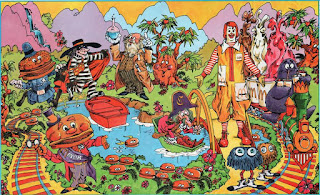Then, there is Mayor McCheese, resident of, and remnant from McDonaldland, an advertising campaign introduced in 1970 to sell fast food to children, when that was still acceptable. Ronald McDonald, the Hamburglar and Grimace were all residents of McDonaldland until 2003, when McDonald’s dropped the use of it, but while those characters continue to be used, Mayor McCheese had been kicked out of town as long ago as 1985.
Ultimately, the reason for this exile is obvious – Mayor McCheese is a humanoid with a burger for a head, a mayoral sash, and the voice like comedian Ed Wynn, who was the Mad Hatter in Disney’s animated “Alice in Wonderland” (1951), the perfect combination of “what was that about?” that makes for cutaway gags in episodes of “Family Guy.” However, that very combination of nightmare fuel was what ultimately tripped up Mayor McCheese and McDonald’s, when they were sued for copyright theft.
I don’t believe the children’s TV series “H.R. Pufnstuf,” shown in 1969, ever made it to the UK, but because “The Banana Splits,” also created by puppeteers Sid & Marty Krofft, did reach us, it is easy to extrapolate. The show was performed using large costumes and puppets, and was the story of a stranger in Living Island, where all inanimate objects could come alive, and were targeted by the witch Wilhelmina W. Witchiepoo. The stranger, Jimmy, was played by Jack Wild, just nominated for an Oscar for playing the Artful Dodger in “Oliver!”
H.R. Pufnstuf was the name of the mayor of Living Island, and while he was a dragon, he was a humanoid character, with a very large head, a mayoral sash, and an odd voice, if not sounding like Ed Wynn – many other characters on the show, however, did parody Hollywood film stars. There are enough elements shared between H.R. Pufnstuf and Mayor McCheese to argue there was, at the very least, a coincidence, but it was one was big enough to question the character’s origins, which brought the rest of McDonaldland down with it.
As detailed in the lawsuit “Sid & Marty Krofft Television Productions Inc. v. McDonald’s Corp.”, the Kroffts had been in contact with Needham, Harper & Steers, the advertising agency that created the McDonaldland campaign, about working with them. After a number of phone calls, the Kroffts were ultimately told the campaign had been cancelled, when in fact the agency was to proceed on their own -the first advertisements were created by former Krofft employees, while “H.R. Pufnstuf” voice actor Lennie Weinrib was also involved. The newer work became more popular than the Kroffts’ original show, causing them to lose licensing deals for toys and other products.
In the original case, the Kroffts won $50,000 in damages, deemed to be the value of their work that McDonald’s benefitted from – both sides appealed. Four years later, the Kroffts won over a million dollars in damages. What had changed was the case having established extrinsic and intrinsic tests for whether a work had violated copyright, moving beyond simply deciding if an idea had been copied, into comparing both the factual similarities between works, and whether “the man in the street” would consider the two works to be similar. A footnote in the case’s decision reads: “Both lands are governed by mayors who have disproportionately large round heads dominated by long wide mouths. They are assisted by ‘Keystone cop’ characters... It seems clear that such similarities go beyond merely that of the idea into the area of expression.” For the record, copyrights relating to the Keystone Cops expired some time beforehand.
McDonaldland continued in its original form until 1985, although McDonald’s would later advertise their evening opening times with the “Mac Tonight” advert, featuring a man at a piano, singing “Mack the Knife” – “now that Mac[k] is back in town” – with a crescent moon for a head, wearing sunglasses. Sid & Marty Krofft would later be sued by Paul Simon, as the theme for “H.R. Pufnstuf” sounded too close to the Simon & Garfunkel song, “The 59th Street Bridge Song (Feelin’ Groovy),” both extrinsically and intrinsically. No-one put eyes on a burger ever again.






No comments:
Post a Comment